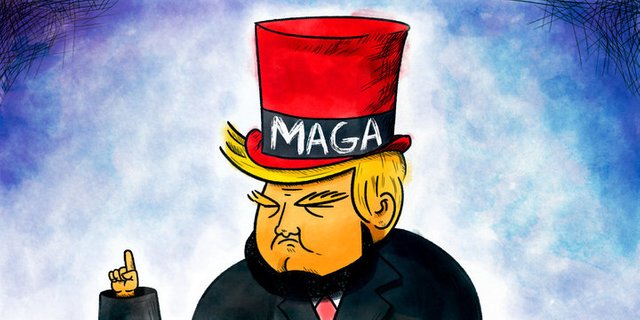Don’t Let Dishonest Don Erase Honest Abe

Michael Wolff’s blistering account of the Trump administration’s first year, Fire and Fury, prompted what has now become the president’s routine response to anyone who criticizes him. “Full of lies, misrepresentations and sources that don’t exist,” President Donald Trump angrily tweeted about the book.
Like most of Trump’s pronouncements, this was boilerplate projection. If anything is full of lies, it is the president himself. As The Washington Post documented back in November, Trump had made 1,628 “false or misleading claims” in less than 300 days in office ― for an astonishing average of 5.5 false statements a day. That pace has not abated.
Trump’s lies have ranged from the consequential to the quotidian, from sustained misrepresentations about the Affordable Care Act to his bizarre obsession with lying about crowd sizes. Many of the lies are banal, easily disproven and seemingly harmless in their pettiness and irrelevance. But that is the very danger. With his daily doses of deceit, Trump is undermining the notion of truth and waging war on the foundations of American democracy. As Trumpism becomes normalized, we risk abandoning the norms that have long guided American public life, including the expectations we have of those who hold the nation’s highest office.
BE THE FIRST TO KNOW
DOWNLOAD
Those norms are not so much rules or laws as they are habits and rituals. And they are shaped by the stories that a people tell about themselves. As long as we have had presidents, we have told stories about them. Often more hagiography than biography, these tales of the presidents, especially in the early republic, helped create Americans’ expectations of their leaders and the obligations of high office.
Amid all the accounts of heroism and honor, it’s telling that the most enduring presidential stories concern the unyielding honesty of George Washington and Abraham Lincoln, our two most admired leaders. These stories acknowledged the importance of truth to a democracy and taught us that lies from a leader breed corruption and undermine the public trust.
Americans must not lose sight of the exceptionality of Trump’s deceit.
Mason Locke Weems’ The Life of Washington, published in 1800 just shortly after Washington’s death, helped set the presidential standard. The book’s famous tale of young George confessing to chopping down a cherry tree may have been mostly legend, but it conveyed a deeper truth about what sort of person should inhabit the presidency, a vital lesson for a new nation.
The tales of Lincoln’s steadfast honesty circulated long before he reached the Oval Office. When he was still a young man, Lincoln’s neighbors and business associates bestowed on him the nickname “Honest Abe” because of his trustworthy dealings with them and his unquestionable character. Running for president years later, Lincoln turned the moniker into a campaign slogan. A popular 1863 children’s book, The Pioneer Boy, and How He Became President, immortalized the tale for generations of schoolchildren.
Dismissing such stories as fables from a bygone era, meant only for children, ignores how important these tales have been in providing a nation with its sense of self. They serve as a blueprint for leadership and a roadmap for a nation’s character. It is why we keep telling them, even as we acknowledge our skepticism about their literal truth.
We don’t look for our presidents to be heroes anymore, of course. Watergate alleviated us of such fantasies. But when Americans remember Honest Abe or George “I cannot tell a lie” Washington, they aren’t thinking so much of the individual men as they are establishing those traits as a baseline for American leadership.
Trump’s presidency threatens those very assumptions.
Some will argue that the current president is no different from other modern-day politicians in this regard. For sure, Trump is not sui generis, but rather symptomatic of a deeper brokenness in American politics and public life ― one that would allow such a man to ascend to the White House in the first place.
Still, Americans must not lose sight of the exceptionality of Trump’s deceit nor ignore how significant a departure he represents from the basic standards of prior presidents, however flawed those men may have been.
Near the end of Lincoln’s presidency, his wife wrote to a friend that her husband was “almost a monomaniac on the subject of honesty.” Trump has his own monomaniacal tendencies, but a compulsion to truth-telling has never been one of them. The question, then, is not whether Trump will continue to lie. His habit of doing so owes to his damaged personal character, but also reflects a conscious political tactic, one he has exploited to enormous success. (It’s always worth remembering that Trump’s own ascent onto the national political stage relied on his odious untruth about President Barack Obama’s birthplace.)
The question, rather, is how Trump’s presidency will change the stories Americans tell about their leaders and the nation as they would have it be. The American people may no longer expect their president to be another Honest Abe. But they must never meekly accept that a Dishonest Don sits in that same office.
Neil J. Young is a historian and author of We Gather Together: The Religious Right and the Problem of Interfaith Politics. He hosts the history podcast “Past Present.”
This piece is part of HuffPost’s brand-new Opinion section. For more information on how to pitch us an idea, go here.